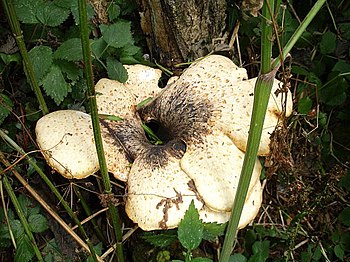 |
| English: Fungus. Large fungal growth on a tree on 199525. (Photo credit: Wikipedia) |
Hidden under your feet is an information superhighway that allows plants to communicate and help each other out. It’s made of fungi ........ That tree in your garden is probably hooked up to a bush several metres away, thanks to mycelia. ..... They aren't just sitting there quietly growing. By linking to the fungal network they can help out their neighbours by sharing nutrients and information – or sabotage unwelcome plants by spreading toxic chemicals through the network. This "wood wide web", it turns out, even has its own version of cybercrime. ..... Simply plugging in to mycelial networks makes plants more resistant to disease. ..... mycorrhizae also connect plants that may be widely separated. ..... similarities between mycelia and ARPANET, the US Department of Defense's early version of the internet. ..... James Cameron's 2009 blockbuster Avatar. On the forest moon where the movie takes place, all the organisms are connected. They can communicate and collectively manage resources, thanks to "some kind of electrochemical communication between the roots of trees". ..... large trees help out small, younger ones using the fungal internet. .... when plants are attached by harmful fungi, they release chemical signals into the mycelia that warn their neighbours. ..... broad beans also use fungal networks to pick up on impending threats – in this case, hungry aphids. ...... plants' fungal connections mean they are never truly alone, and that malevolent neighbours can harm them. ...... some plants steal from each other using the internet. There are plants that don't have chlorophyll ..... plant cybercrime can be much more sinister than a bit of petty theft. ...... spotted knapweed, slender wild oat and soft brome can all change the fungal make-up of soils. According to Morris, this might allow them to better target rival species with toxic chemicals, by favouring the growth of fungi to which they can both connect. ...... The wood wide web






